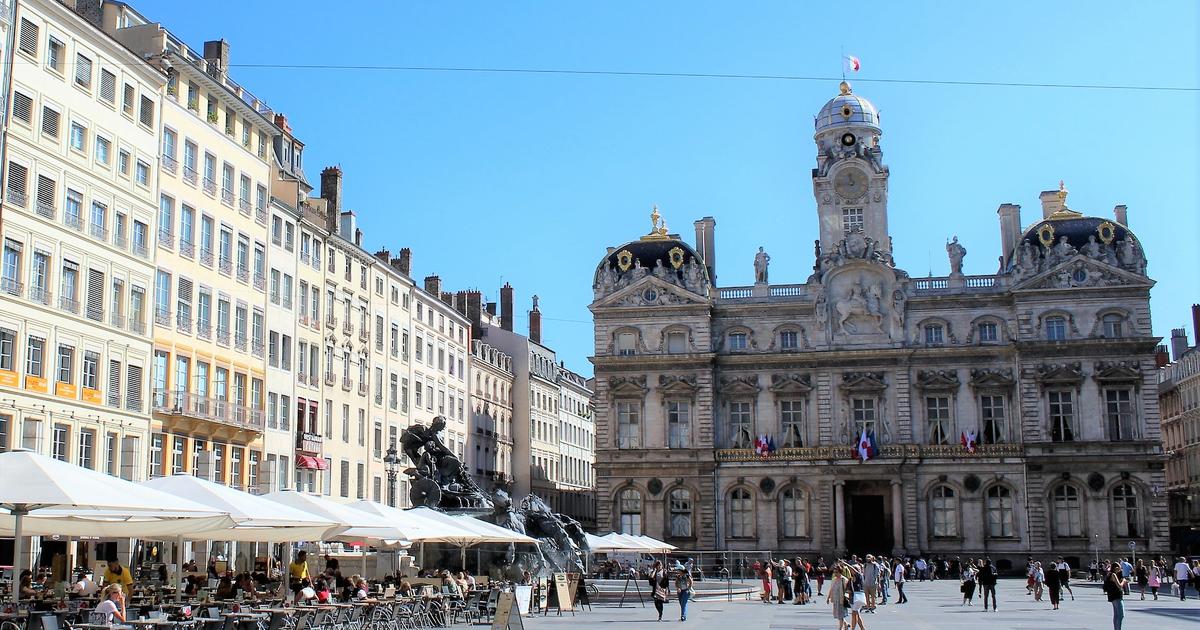Ferghane Azihari is general delegate of the Free Academy of Human Sciences (ALSH) and member of the Society of Political Economy (SEP). He published
Les Écologistes contre la modernité
at the Presses de la Cité
To discover
Michel Houellebecq: "A civilization which legalizes euthanasia loses all rights to respect"
FIGAROVOX. - Your book
Ecologists against modernity
is captioned "The trial of Prometheus".
In
the Responsibility Principle
(1979), the philosopher Hans Jonas refers to the myth of Prometheus to denounce the reckless risks of certain human behaviors and certain technical choices, in relation to the ecological, social and economic balance of the planet.
Are you looking in this book to side with the accused?
Ferghane AZIHARI. -
In Greek mythology, Prometheus is the titan who gives fire to men.
He now embodies the industrial civilization so decried by political ecology.
I try to restore his record by offering him a fair trial.
It is not only a matter of reminding us that industrial society has delivered us from famine, ignorance, disease, the devastating effects of natural hazards and hardship.
It is also necessary to eliminate the myth of the lost paradise which claims that our environment has never been as toxic as it is today.
We owe this fable to the Rousseauist inclinations of ecological ideology: they reproach industrial progress for sullying our world.
Cavemen and pre-industrial towns were exposed to far more devastating environmental nuisances than city dwellers in modern metropolises.
Ferghane azihari
This Declinist narrative suggests that premodern societies had a more harmonious relationship with their environment. But this nostalgia has no basis. Cavemen and pre-industrial towns were exposed to far more devastating environmental nuisances than city dwellers in modern metropolises. Pollution and natural disasters claim more lives in less industrialized countries than in developed nations. Finally, the latter are better equipped than the former to face climate change. It would be immoral and counterproductive to renounce the expansion of industrialism. We would betray the peoples trapped in pre-modern ecological scourges by removing humanity from solutions to new challenges.
To read also "The Greens should stop presenting themselves under the banner of the environment and assume that of puritanism"
You denounce a technocritical reading of the myth of Prometheus. Don't you think, however, that we should distinguish between ancient technique (tools) and modern technique - as the ultimate manifestation of will to power (capable of turning against humans)?
Technology still stems from what the philosopher Jacques Ellul scornfully called the “passion for efficiency”.
Its purpose is to increase our power.
The question is whether this quest for power is benevolent or not.
Political ecology views it with pessimism. Hans Jonas wrote that the real threat posed by technology "
does not lie so much in its means of destruction as in its peaceful daily use
". The technique is accused of increasing the destructive inclinations of man.
The tragedies of the twentieth century and the attention given to new risks have reinforced the prestige of this reading, even if it means falling into the fable of the good savage. Yet the work of Lawrence Keeley shows that prehistoric wars were more frequent and deadly than modern conflicts. The Hutus hardly needed high technology to decimate the Tutsis. Returning to the environment, the rudimentary tools of the hunter-gatherers were enough to drive some of the Pleistocene megafauna to extinction while their way of life demanded regular infanticides and geronticides.
By going against the current of globalization, localism and degrowth constitute a profound disinterest in the fate of humanity.
Studies suggest that only a third of humanity could feed in a localist world.
Should we kill the others?
Ferghane azihari
Of course, we must not fall into the opposite excess, which sees in technical progress the sufficient condition for moral progress, forgetting the cultural variable.
But in this case, and in spite of the new risks, the security record of modernity is positive, as evidenced by our evolutionary success.
It is up to us to ensure that it remains so by using our power to serve our species and not to enslave it.
Why, neither the program of the Greens, nor the localism of a Hervé Juvin can constitute viable alternatives, according to you?
Already in the 17th century, the humanist Hugo Grotius noted that the basis of world trade lay in the unequal geographical distribution of resources and fertile land as well as the inability of nations to meet their needs on their own.
By going against the current of globalization, localism and degrowth constitute a profound disinterest in the fate of humanity.
Studies suggest that only a third of humanity could feed in a localist world.
Should we kill the others?
When environmentalists slay productivism, want to reduce agricultural yields, prefer intermittent energy sources to abundant energies, one can wonder if the humanitarian slaughter is not deliberately sought.
Especially since the ecological virtues of these proposals are overestimated.
All other things being equal, low-yield agriculture means more deforestation.
To read also Climate: "Ecologists do not want to save the environment but to destroy industrial civilization"
Localism neglects the fact that transport contributes little to pollution in proportion, unlike the production phase. This is why it is sometimes less polluting to obtain a product produced by a foreign industrialist who, for geographical, climatic, technical, logistical reasons or through the play of economies of scale, manages to use fewer resources to produce a product. unit of wealth than a local producer with inefficient methods. If every French city produced its food locally, the waste would explode.
Finally, a collapse in world trade would impoverish humanity, as we have seen with the Covid, which would reduce its ability to invest in clean but expensive technologies.
To green our world without giving up improving the lot of humanity, it would be more virtuous for the rich countries to invest in the modernization of their productive apparatus as well as in that of the countries of the South.
Pope Francis charges with extremism those who, in the wake of the Enlightenment, place their trust in progress to solve our current problems!
I see in this inflection of Catholic discourse the sign of the hegemony of a misanthropic ecology.
Ferghane azihari
You equate
"
integral ecology
"
with pantheism and assert that this ecology
"
which appeals to so many conservatives is originally the pure product of a neopaian and anti-Christian right
"
. Are you not confusing here the
“
deep ecology
”
of the New Right and the
“
integral ecology
”
proposed by Pope Francis in his encyclical Laudato Si? Indeed, the Church advocates an anthropocentric ecology, which makes men responsible by asking them to respect the
"
common house
"
...
Deep ecology personifies wild nature by placing it above man, while integral ecology, in the words of the New Right Manifesto published in 2000, "
calls for going beyond modern anthropocentrism
". Admittedly, it "does not erase the specificity of man", but it denies him all the same "the exclusive place which Christianity and classical humanism had given him".
These two schools have in common that they are wary of the sovereignty that man exercises over nature.
This mistrust is now shared by the Pope.
Proof of this is that he prefers to denounce the "anthropocentric excess" which would define our time than to underline the violations of human rights which slow down the development of the countries of the South.
The Sovereign Pontiff also proposes to slow down development, or even to abandon it.
This shows that humanism is no longer its reading grid.
To read also "Everything is linked": the ecology of the body is not incidental in the integral ecology
How not to detect scraps of paganism in a discourse which counts our “oppressed Earth” among the poor, accuses men of “plundering” nature as if only Gaia owned the resources and that we would no longer be entitled to dispose of them ( as do all other living things on their humble scale)?
I'm not even talking about the frozen image of the biosphere inherited from the pre-Darwinian era which equates any transformation of ecosystems with destruction. François finally taxes with extremism those who, in the wake of the Enlightenment, place their confidence in progress to solve our current problems! I see in this inflection of the Catholic discourse the sign of the hegemony of a misanthropic ecology to which we must give pledges: it no longer defines the protection of nature as the safeguard of a hospitable environment for man, but like the “sanctuary” of an environment from which it must be excluded. However, environmentalists insist - rightly - on the fact that man belongs to nature! Sapiens must obviously seek other allies.
The height is now to see the radical left, once favorable to the "right to laziness", pleading to assign humanity to the curse of Sisyphus: an infinite effort for no gain.
Ferghane azihari
You show that working hours have been reduced considerably since the industrial revolution. If we are to rejoice in the non-arduousness of the work, is it desirable to see it disappear?
Since Plato, Western political philosophy has accepted that the goal of societies lies in alleviating the pain that man inflicts on himself to satisfy his needs.
This is why we prefer the City to the hermitage.
The reduction of labor is a natural and universal aspiration.
It did not wait for the emergence of the workers' question in the 19th century to manifest itself. In 1516, the humanist thinker Thomas More imagined a utopian world where 6 hours of work per day are enough to live well. And while the average Western worker had to work over 3,000 hours a year to buy the 19th century standard of living, he can now work 1,500 hours a year, or 4 hours a day, to achieve the comforts of the 21st century. . The progress of industry and the openness of commerce make it possible to do better than More's utopia.
The liberal that I am does not see work as an end in itself.
It is only the vulgar price to pay to live, to satisfy its needs and to serve its fellow-men.
The goal of progress is to reduce this price to strive for perfection (even if we will never reach it) that the economist Frédéric Bastiat described in his time: zero effort for infinite gain.
Read alsoThe decrease in working time in France explained in 4 graphs
These ideals have long been consensual.
But the height is now to see the radical left, once favorable to the "right to laziness", pleading to assign humanity to the curse of Sisyphus: an infinite effort for no gain.
This is how we must interpret the proposals of Nicolas Hulot or Dominique Bourg.
The latter wants to return a third of the population to the fields, with the only help "muscular and animal energy".
These reactionary delusions would be funny if they did not influence the "moderate" officials: we have already heard a French minister plead for the return to agricultural practices of our grandparents.
You consider that Thomas Malthus, who proposed a birth control policy to conserve resources, was wrong. Why ?
Malthus feared the scenario of wealth production unable to keep up with exponential population growth.
Despite its mistakes, the scarecrow of overpopulation continues to be waved by environmentalists, as evidenced by the cases of Paul Ehrlich, who envisioned forced sterilization, or Pablo Servigne, who suggests in his bestseller that we we must now choose who should be born so as not to have to choose who should die tomorrow.
A metropolis equipped with electricity and wastewater treatment benefits from a better quality environment than a small town without these technologies.
Ferghane azihari
Remember that in Malthus' time, there were a billion of us and poverty was the norm. Today, we are 8 billion and misery becomes the exception, which invalidates the doomsday scenarios that we could read in the 70s through the report to the Club of Rome. These humanitarian advances can be explained by the fact that men, far from being just bellies on their feet, are first and foremost workers, engineers and innovators. They create more than they destroy.
Jean Bodin was right to underline from the 16th century that one should never fear that there are too many citizens to the extent that there is only wealth of men. Now, neo-Malthusianism claims that an “overpopulation” of wealthy beings threatens to make our planet toxic. The reasoning seems logical a priori. We can indeed say that, all other things being equal, the more we are, the more we consume, the more we pollute. Except that the technological variable means that things are never equal elsewhere!
For example, Paris had 200,000 souls in 1328, or 10 times less than today.
However, pollution killed a higher proportion of Parisians in the Middle Ages than in the 21st century: a metropolis equipped with electricity and wastewater treatment benefits from a better quality environment than a small town devoid of these technologies. .
Read alsoHow is the number of deaths linked to air pollution calculated?
The reasoning holds true for climate change. Between 1979 and 2019, thanks to nuclear power and energy efficiency, French territorial CO2 emissions fell while the French population gained 11 million inhabitants over the same period and our industrial production was higher in 2019 than 'in 1979 in absolute value. Imported emissions will follow the same path as our trading partners obtain our technologies.
However, as economist Julian Simon reminded us, a large demographic favors innovation, because it allows an abundance of brilliant arms and brains. Finally, the play of economies of scale makes it easier for large communities to obtain clean technologies which, because they are expensive, would be inaccessible to small communities. This is the reason why cities are better equipped than the countryside in infrastructure essential to a healthy environment, such as sewer networks or treatment plants. To save our habitat, it is better to have large families made up of engineers than single Zadistas. Moreover, if we look at current demographic trajectories, the threat that hangs over us is rather the aging and demographic decline of our species.
Rather than making emerging countries feel guilty, we should promote the ideal of an ambitious nuclear industry, capable of knocking on the door of all countries anxious to free themselves from poverty and fossil fuels.
Ferghane azihari
If no green solution finds favor in your eyes, what do you propose to respond to the climate emergency, about which scientists are alerting us?
I denounce a strange recurrence among environmentalists. The measures they propose always contravene or even worsen the resolution of the problems they highlight. We cannot understand this dissonance if we do not link it to the anti-capitalist ulterior motives of this movement. I quote in my work eminent ecological authors who dread the scenario of a humanity which manages to endow itself with an abundant energy, even if it is clean, and who present poverty as the desirable horizon of our species. This is enough to prove their insincerity.
If the goal is to fight against climate change by ensuring the highest possible standard of living for humanity, then, in addition to energy efficiency, it must stop closing nuclear power plants and convert massively to atomic energy, which is the most carbon-free, reliable and efficient source of energy on a large scale.
The hundreds of billions that governments and the private sector in developed countries squander in wind and solar must be immediately reallocated to the atom.
Without this, any attempt to decarbonize global electricity, electrify our uses, synthesize clean fuels or fertilizers or invest in CO₂ capture will be inefficient.
Read also "We Europeans need nuclear power!"
Rather than making emerging countries feel guilty, we should promote the ideal of an ambitious nuclear industry, capable of knocking on the door of all countries anxious to free themselves from poverty and fossil fuels. We must also not forget the imperative of adaptation, which again shows the futility of post-growth: the resistance of societies to natural hazards increases with wealth. An Israeli or a Dutchman who can procure seawater desalination stations or an ultra-sophisticated coastal protection system against rising sea levels is less vulnerable to drought and flooding than a Malagasy or a Bangladeshi.
One of the responses to climate change is to ensure that these resilience gains precede the emergence of new risks.
These are just the first avenues that deserve to be explored in depth by entrepreneurs, engineers and scientists humanistic enough to reject the discourse that pretends to be worried about the evils of climate change in order to assign men to the scourges of poverty.
Ecologists against modernity, The trial of Prometheus
, Ferghane Azihari, Les Presses de la Cité, 240 p., € 18.
The Presses of the city


/cloudfront-eu-central-1.images.arcpublishing.com/prisa/VB2FZXRBEFBPNAN5IFP75J6YOM.jpg)









/cloudfront-eu-central-1.images.arcpublishing.com/prisa/KMEYMJKESBAZBE4MRBAM4TGHIQ.jpg)


